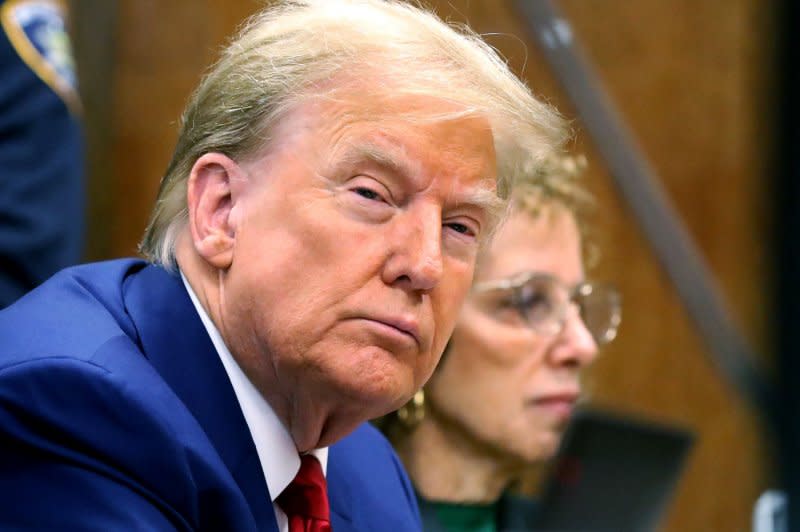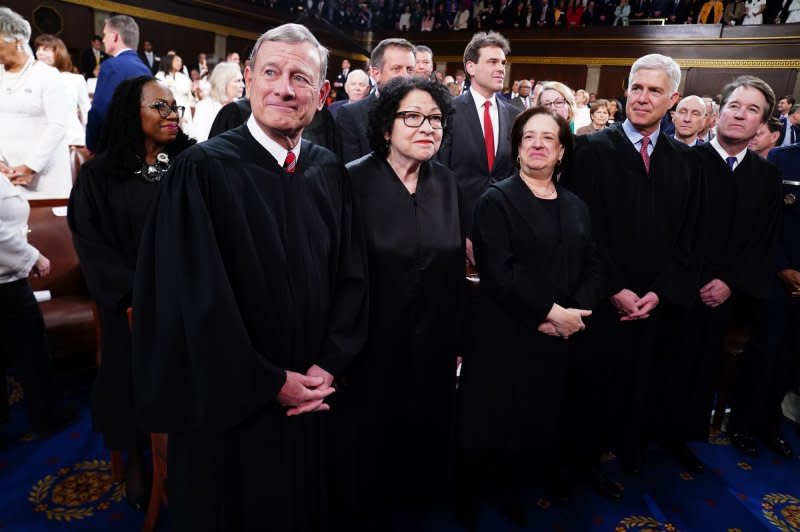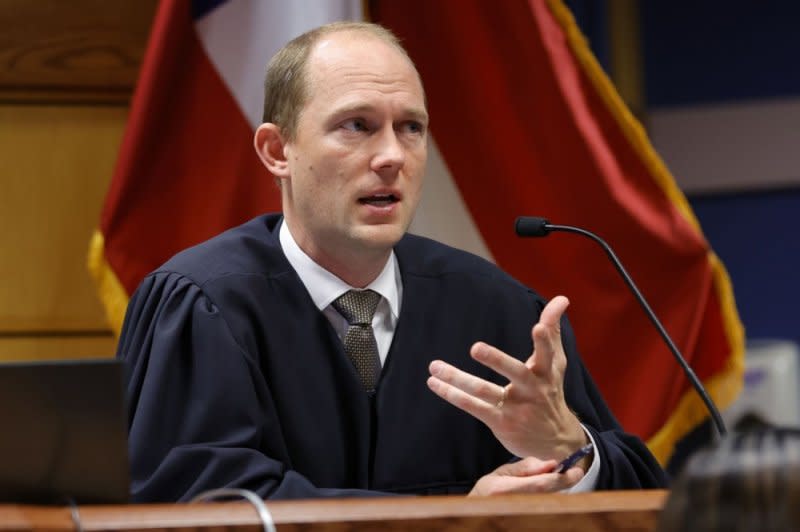Donald Trump's rights as a defendant stretch public's right to a speedy trial

- Oops!Something went wrong.Please try again later.
March 29 (UPI) -- One year after Donald Trump was first indicted on criminal charges, none of his four criminal trials have begun. An organization of legal experts is calling on the court system to uphold the public's interest in a speedy trial.
A precedent has been set in case law to recognize the people's right to a speedy trial, and that has been reaffirmed by Congress. Conor Gaffney, legal counsel with nonprofit organization Protect Democracy, told UPI there are several reasons why this is important.
"One we can see is that here in Trump's cases, delay is often used as a defense tactic," Gaffney said. "An unnecessary, prolonged delay can allow evidence to stale, witness memory to fade."
Gaffney co-wrote an amicus brief to the Supreme Court, along with others from Protect Democracy. The brief was filed as the high court weighs Trump's claim of presidential immunity.
The presidential immunity claim is just one of the issues that has kept trials from beginning.

The former president's defense has successfully delayed two state court and two federal court trials, some by months. The federal trial over Trump's role in the Jan. 6, 2021, attack on the U.S. Capitol in Washington and the hush-money trial in New York were at one time scheduled to begin in March.
'Justice delayed'

The argument from Protect Democracy evokes the phrase "justice delayed is justice denied," quoted in various instances throughout history. It is a legal principle that means legal remedy, if delayed, is as ineffective as no legal remedy at all.
Gaffney refers to the precedent established in the case Barker vs. Wingo that has long been recognized. The Supreme Court said in this case that "society has a particular interest in bringing swift prosecutions."
This principle was later encoded into law by the U.S. Congress in the Speedy Trial Act of 1974. The law orders that trials must commence within 70 days from the date that the indictment was filed, but no sooner than 30 days unless the defendant agrees.
The law, Gaffney says, establishes a baseline for what is considered enough time for the defense to be prepared for trial. It allows for delays, as long as they are justified.
Trump's defense attorneys' primary role before trial is to ensure their client's rights as a defendant are protected. This means advocating for access to the evidence that will be used in trial and making sure they have adequate time to prepare their arguments.
A defendant's right to due process is paramount.
Election Day approaches
As Gaffney notes, Trump and his attorneys have been clear about their larger goal. They seek to delay all trials until after the election on Nov. 5. Trump will be the Republican nominee for president opposite President Joe Biden on the Democratic side of the ticket.
Judges have noted the timeliness -- or lack of -- in Trump's appeals. Judge Juan Merchan, presiding over the Manhattan hush-money case, questioned why the defense waited months before requesting documents from the prosecution. Documents they knew would be part of the trial.
U.S. District Judge Tanya S. Chutkan made a similar observation of Trump's defense in the Jan. 6 case in Washington.
"Every single criminal case is different," Gaffney said. "Considering the circumstances of this prosecution -- seven months seems quite reasonable and fair."
Trump has alleged that the cases against him are politically motivated and an attempt by the Biden administration to interfere in the election.
The circumstances surrounding Trump and the criminal cases against him are unusual. He is the first former president to be criminally indicted, let alone indicted four times on more than 90 criminal charges.
But Trump is far from the only political candidate to face trial. It has happened to senators, members of congress and state officials on many occasions.
For example, in 2008, Alaska Sen. Ted Stevens was indicted and ultimately found guilty of making false statements when he concealed receiving hundreds of thousands of dollars worth of gifts.
Stevens was running for re-election at the time of the indictment, but his approach to the trial was different from Trump's. He pushed for the trial to occur before Election Day, hoping to clear his name. After being found guilty, the charges were eventually dismissed.
If elected, it is presumed Trump would direct his attorney general to toss out all of the cases. David S. Weinstein, an attorney with Jones Walker in Miami and a former federal prosecutor in the Southern District of Florida, told UPI that path is not as clear as it may seem.
"He is going to say he is entitled to do that," Weinstein said. "I'm not so sure that's what our Constitution or the cases that have interpreted our Constitution are going to say about that."
Crowded schedule
The combination of cases creates a scheduling challenge, as each is replete with its own pretrial matters that must be addressed.
"What's unusual is the length of time some of these pretrial motions are taking to be heard and decisions made," Weinstein said. "It's unusual that the two federal cases are taking so long. They tend to move much quicker than state cases. They're usually resolved in 12 months at the longest."
The trial over alleged hush-money payments Trump made to adult film star Stormy Daniels is set to begin on April 15. At this stage, Weinstein expects at least two trials and possibly a third to be held before the election. Gaffney agrees that two could take place, but finds a third to be less likely.
The verdict in Manhattan is likely to come down in May, Weinstein estimates. The next case, likely the Jan. 6 case, would then begin in June or July. He expects the case over Trump's alleged mishandling of classified documents in Florida to be third in line, beginning in September or October.
Gaffney said the Supreme Court's ruling on Trump's presidential immunity claim may not come down until June. This could push the trial back to the fall, depending on how much time Chutkan allows the defense for preparation.
The public's right to a speedy trial is a consideration for the courts. As alleged, the public is a victim of Trump's crimes in numerous ways. Voters' rights have been infringed upon in the election subversion case in Fulton County, Ga., and in the Jan. 6 case. Public safety has been put at risk in the classified documents case.
But other matters weigh more heavily as the judges plot the path forward to trial.
"It's a consideration but I don't think it's top on the list," Weinstein said of the public's right to a speedy trial. "You look at availability, whether evidence is provided and reviewed in a timely fashion. Certainly it's not in the top three to five things to consider."
Those top considerations are Trump's right to due process, his team's ability to have adequate preparation time, the obligation of the prosecution to provide evidence to the defense and the right of the defendant to be informed of the nature of the charges against him.
Weinstein adds that judges are also being cautious because of the high-profile nature of these cases.
"It's unusual in an average case for there to be so much deference given to a defendant by a variety of different judges," he said. "No judge wants to be the one who made an error that was improper based on the law and the facts."
The result of the first case may also impact what happens moving forward.
"Certainly the outcome of the first trial is going to weigh heavily on both the political ramifications and the legal ramifications," Weinstein added. "If the government wins that case it will bolster the arguments being made. If the defense wins, I think that the overwhelming momentum the former president is going to have going into the nomination process."

